Key takeaways:
- Understanding speaker expectations and audience needs enhances speakers’ confidence and performance at events.
- Clear communication regarding event logistics, goals, and feedback fosters a collaborative environment between organizers and speakers.
- Setting realistic goals and creating detailed agendas help speakers tailor their content effectively and reduce anxiety.
- Providing constructive feedback and building trust with speakers contributes to their growth and improves future presentations.
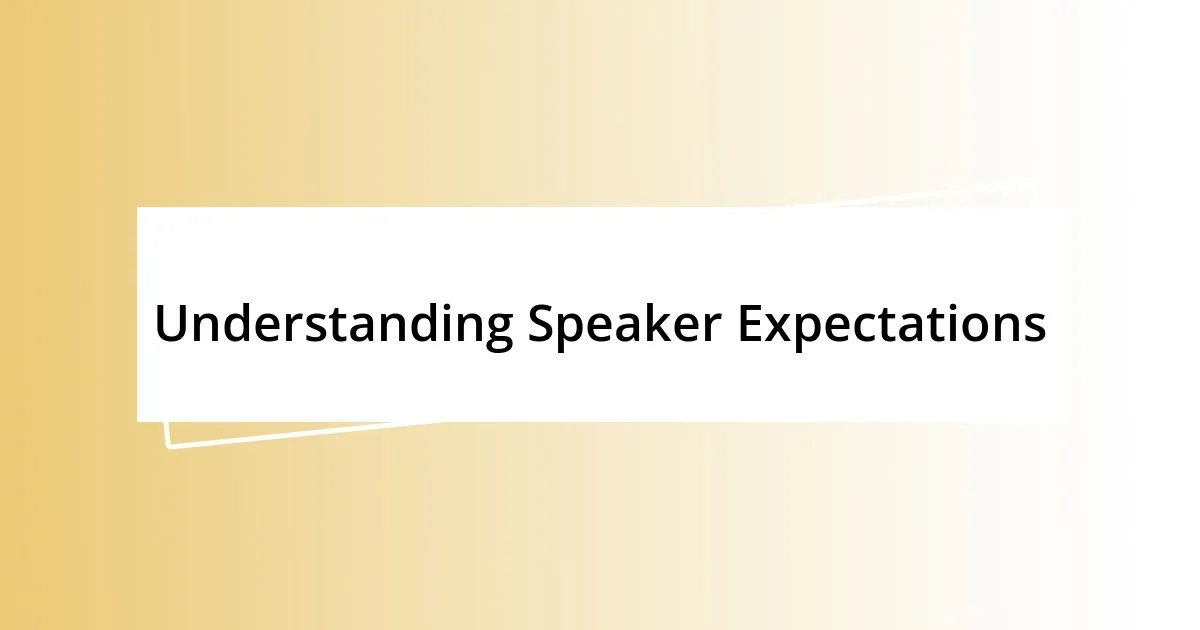
Understanding Speaker Expectations
Understanding speaker expectations is crucial for a successful event. From my personal experience, I’ve learned that every speaker comes with their own set of anticipations that stem from their purpose for speaking and the audience they’ll engage with. Have you ever paused to consider how a speaker’s individual goals—whether to inspire, inform, or entertain—shape their expectations?
I’ve often noticed that speakers truly appreciate understanding their audience beforehand. They want reassurance that their content will resonate and create a connection. Once, I worked with a speaker who was anxious about his first keynote. After some discussions about who would be in the room, he felt that surge of confidence as he tailored his message to that specific group. It was a revealing moment; understanding expectations dials down nerves and elevates performance.
Moreover, open communication about logistics can significantly align speaker expectations. I recall a situation where a last-minute change in venue left a speaker feeling confused and unprepared. If only we had discussed potential contingency plans in advance, that entire experience could have been smoother. Isn’t it fascinating how a simple conversation can bridge the gap between worry and assurance? Understanding these nuances can transform the dynamic between organizers and speakers into a collaboration that thrives on shared goals.
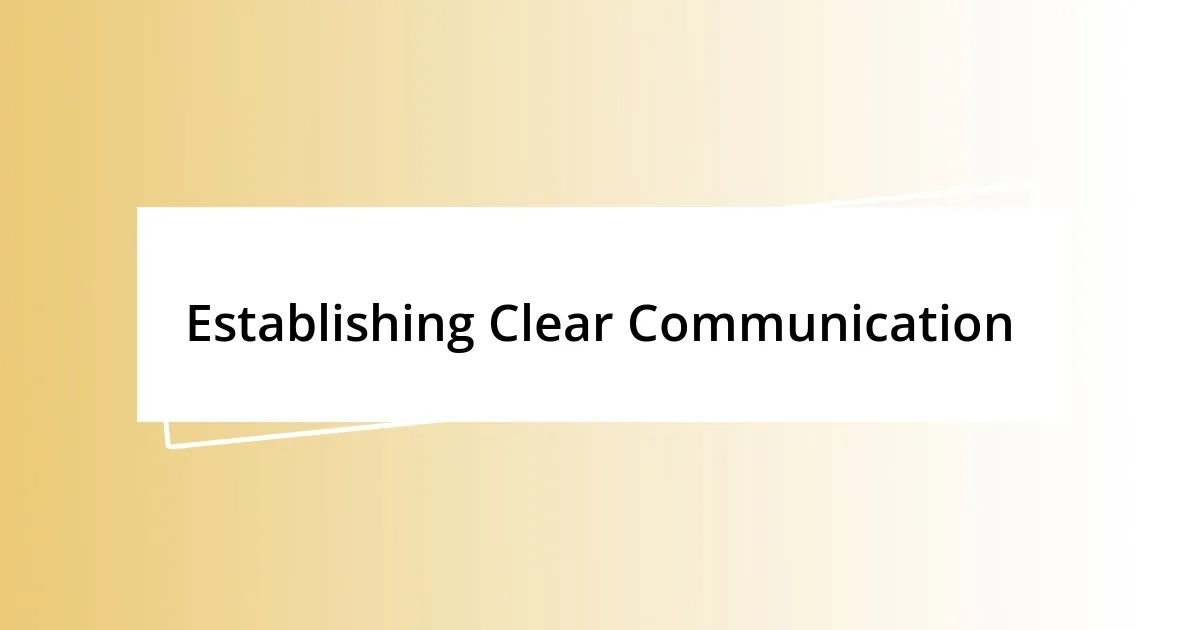
Establishing Clear Communication
I’ve found that establishing clear communication is a game changer when managing speaker expectations. One time, I made it a point to schedule a call with a speaker weeks before the event. During our conversation, I asked about their preferences for presentation style and the type of interaction they hoped to have with the audience. Their insights helped me to better prepare for the event and ultimately resulted in a smoother experience for everyone involved.
Here are a few key communication strategies that can enhance clarity:
- Set Clear Objectives: Share specific goals for the event so speakers can align their content accordingly.
- Discuss Logistics Early: Go over timelines, technical needs, and audience demographics well in advance.
- Encourage Questions: Create an open environment where speakers feel comfortable asking about any uncertainties.
- Provide Regular Updates: Keep speakers in the loop about changes or developments as the event date approaches.
- Follow Up After Events: Ask for feedback on the experience to refine future communications.
These practices have eliminated uncertainty for me and the speakers I’ve worked with, enabling everyone to focus on delivering an impactful presentation.
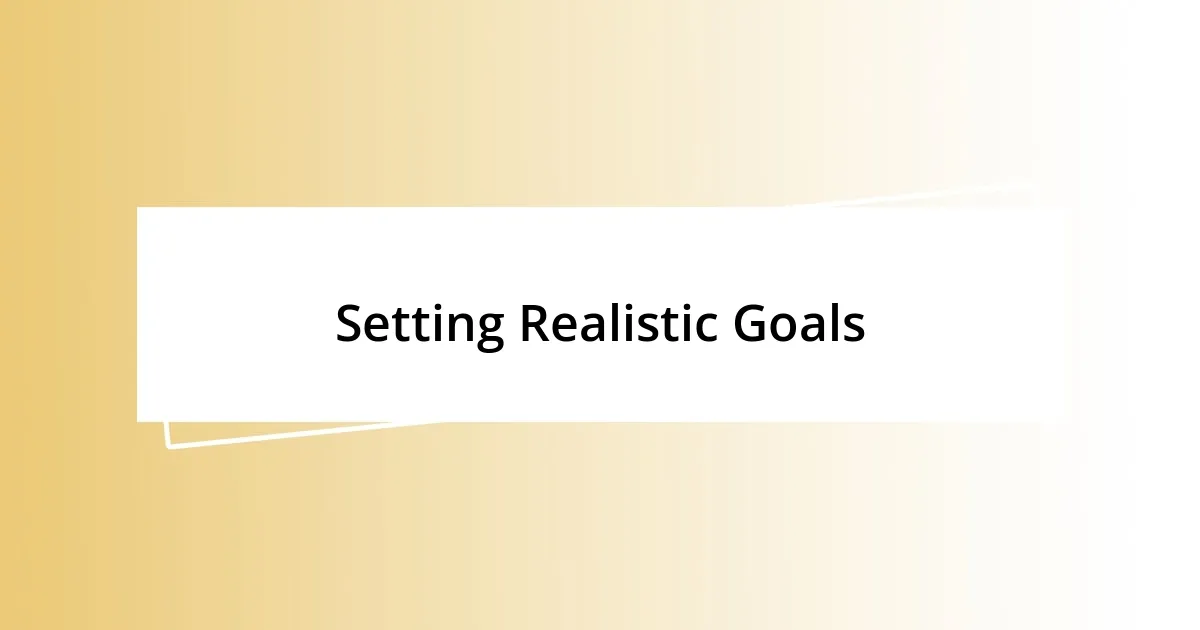
Setting Realistic Goals
Setting realistic goals is a cornerstone of managing speaker expectations. In my experience, clearly defining what both the speaker and the event aim to achieve can create a roadmap for success. For example, once I collaborated with a speaker who aimed to motivate the audience but hadn’t considered the audience’s specific needs. By guiding her to adapt her goals to address those needs, we crafted an impactful message that resonated beautifully with attendees.
I often reflect on the importance of breaking larger ambitions into smaller, attainable targets. This process not only helps speakers feel less overwhelmed but also allows for measurable progress. I remember working with a prominent industry leader who wanted to cover a vast amount of information in just 30 minutes. By advising her to focus on just two key takeaways, she was able to create a compelling presentation that left a lasting impression.
Ultimately, I believe that fostering mutual understanding of realistic goals lays a solid foundation for collaboration. When I see speakers walk in with confidence, knowing they’re aligned with the event’s objectives, it sparks a fulfillment that ultimately benefits everyone involved.
| Goal Setting Strategy | Description |
|---|---|
| Understand Audience Needs | Tailor goals to what the audience wants or needs. |
| Focus on Key Messages | Identify two or three main points to communicate. |
| Set Measurable Outcomes | Define what success looks like for the speaker and the event. |
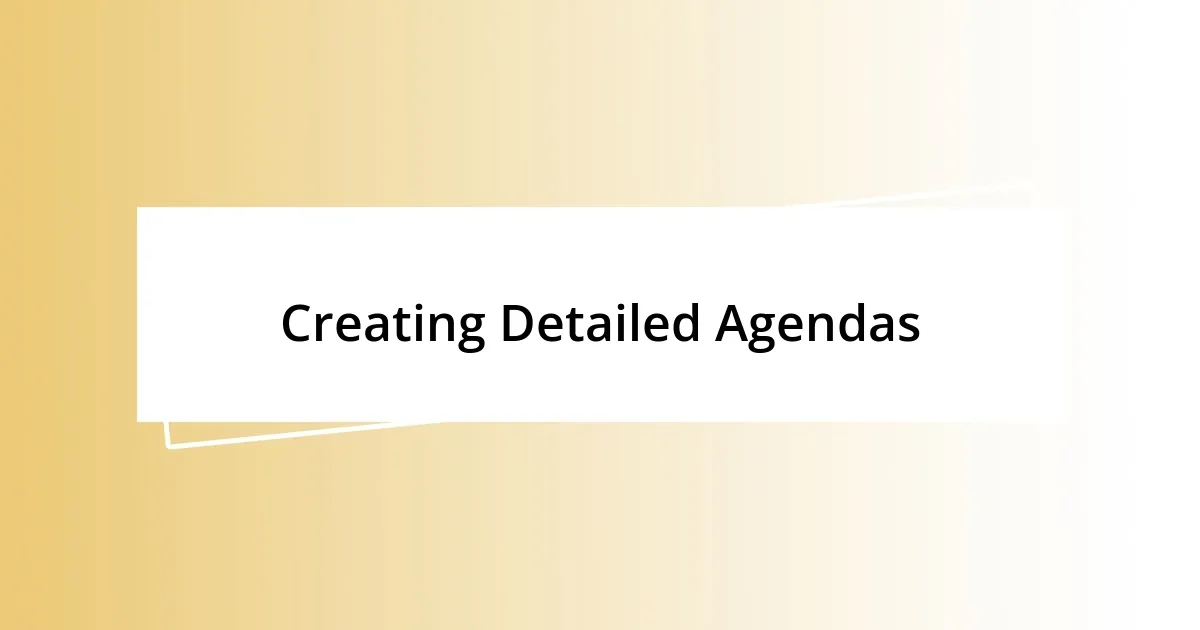
Creating Detailed Agendas
Creating detailed agendas can truly set the stage for a successful event. I remember working on a prominent conference where I crafted a comprehensive agenda that included not just the session titles, but also specific timings, speaker bios, and breaks. This level of detail helped speakers prepare thoroughly, reducing their anxiety and enabling them to hit the ground running. Isn’t it reassuring for a speaker to know exactly what to expect?
I always emphasize the importance of including bullet points or key topics for each session in the agenda. This way, speakers can align their content with what the audience is eager to learn. For instance, I once included a few prompts for a panel discussion, which led to a rich exchange of ideas rather than a repetitive back-and-forth. By having that structure, I saw the energy in the room shift—audience members were engaged and eager to participate. Have you ever noticed how a good structure can elevate the conversation?
Moreover, I like to share the agenda with speakers ahead of time, allowing them to visualize their role within the bigger picture. During a recent workshop, one speaker reached out to ask for clarification on her segment, and this prompted a productive dialogue that enriched her content. This experience reinforced my belief that a well-thought-out agenda isn’t just a schedule; it’s a roadmap that fosters collaboration and clarity. How have your agendas influenced the dynamic of your events?
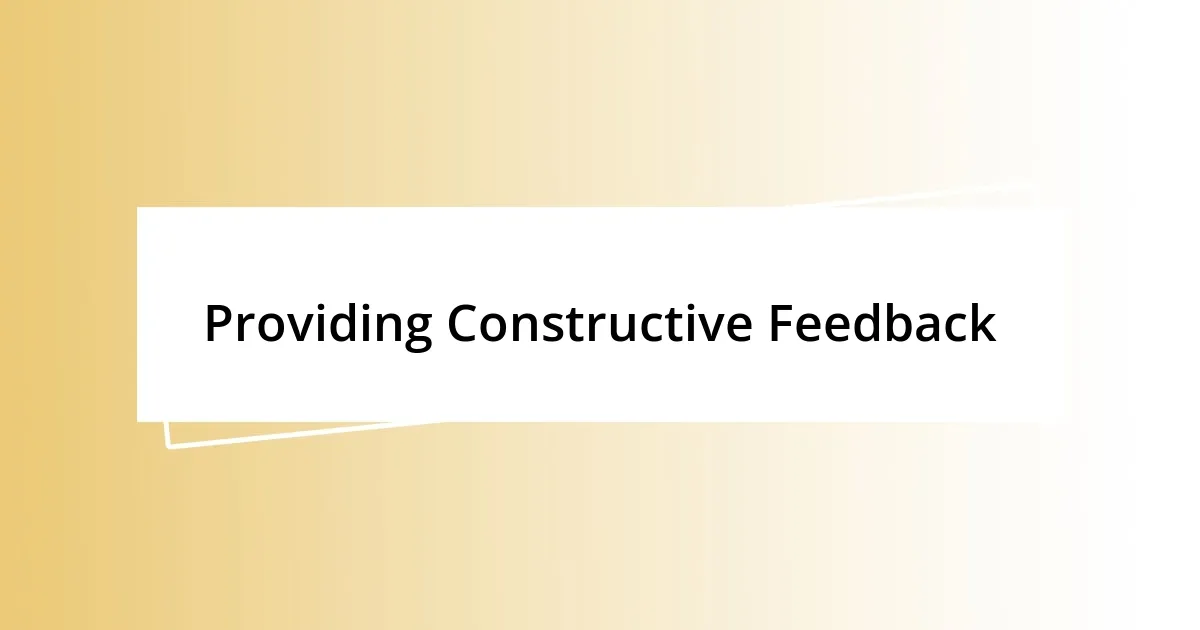
Providing Constructive Feedback
Providing constructive feedback is essential in helping speakers refine their performance. I recall a time when I worked with a speaker who delivered a solid presentation but struggled with pacing. After the session, I gently pointed out how slowing down during key moments could enhance impact. The moment I saw her face light up with understanding confirmed that feedback really can be a powerful tool for growth.
When delivering feedback, I always aim for a balance of praise and constructive criticism. I remember a workshop where a speaker received accolades for her storytelling, but her transitions were a bit shaky. By framing my feedback to emphasize her strengths first, I was then able to suggest smoother transitions in a way that felt supportive rather than overwhelming. This not only boosted her confidence but also empowered her to embrace improvements.
I also encourage an open dialogue about feedback. One time, during a series of coaching sessions, a speaker shared her anxiety about receiving criticism. This prompted me to establish a feedback framework that emphasized collaboration rather than assessment. I noticed that as we worked together, her openness grew, and it was rewarding to watch her transform not just as a speaker, but as a confident communicator. Have you ever found that creating a safe space for feedback can unlock a speaker’s true potential?
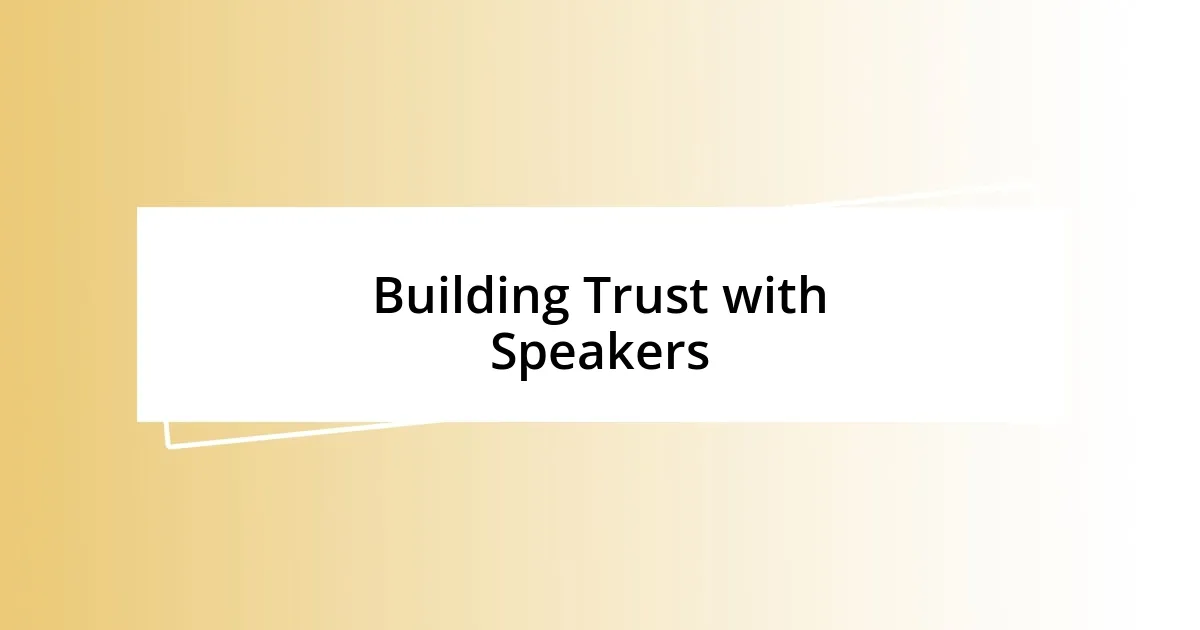
Building Trust with Speakers
Building trust with speakers requires an open line of communication from the very start. I remember a time when I made it a point to check in with a speaker before an event. By simply asking about their expectations and concerns, I noticed how it lightened their worries. It’s amazing how a little conversation can break down barriers and create a sense of partnership, don’t you think?
I always prioritize transparency in all interactions with speakers. During one conference, I shared insights about audience demographics and engagement feedback from previous years. This honesty not only set realistic expectations but also showed the speaker that I valued their expertise. The result? They tailored their content uniquely for our audience, and I could see their dedication shine through. When speakers know you trust them with the audience’s experience, it cultivates a collaborative atmosphere.
Finally, I’ve found that celebrating speakers’ achievements truly strengthens our relationship. I recall sharing a heartfelt thank-you note with a speaker whose session received outstanding reviews. Their surprised expression was priceless, and it opened the door for more candid discussions in the future. Have you ever noticed how recognition deepens connections and builds a foundation of mutual respect?
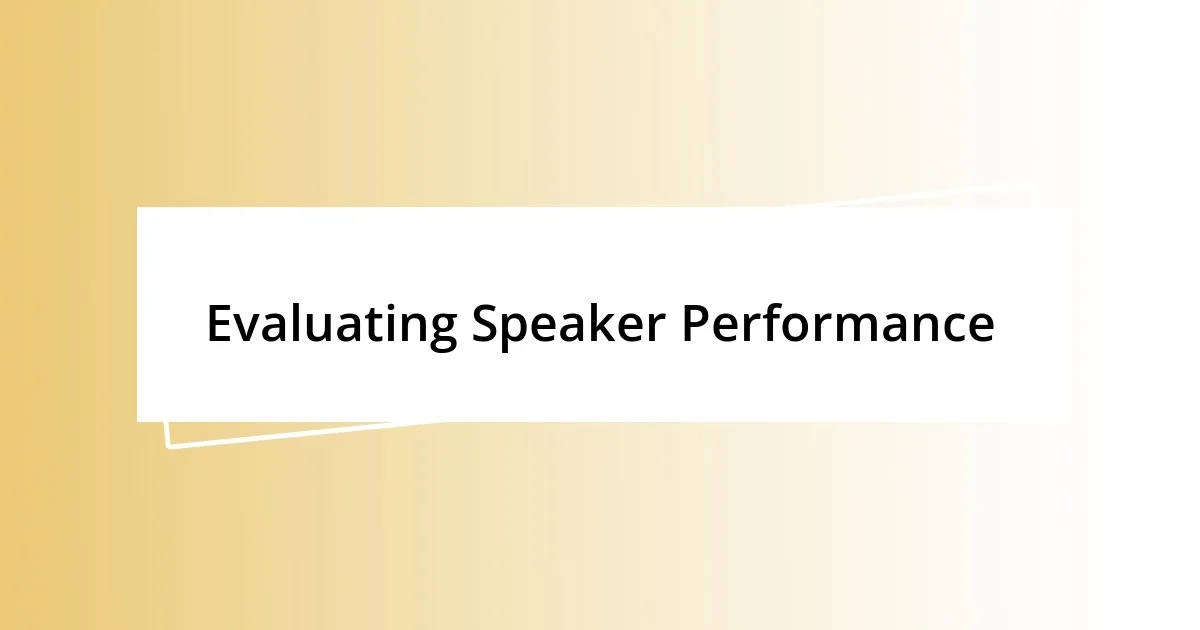
Evaluating Speaker Performance
Evaluating speaker performance is a crucial step in the journey towards excellence. I vividly recall a workshop where the speaker used impactful visuals, yet their voice lacked enthusiasm. Observing audience reactions in the moment was eye-opening; I realized that sometimes the delivery speaks louder than the content itself. Have you ever felt captivated by a presentation despite its simple message simply because the speaker was genuinely excited?
After each session, I like to shed light on both strengths and areas for improvement. One particular speaker had an amazing way of engaging the crowd but struggled with concluding her sessions. I remember suggesting she use a powerful closing statement to leave a lasting impression. Seeing her make that adjustment in future presentations made me appreciate the ripple effect of constructive evaluation. It’s a reminder that evaluating performance is not just about critiquing but about nurturing one’s potential.
I also encourage the use of audience feedback to gauge a speaker’s impact. During a panel discussion I facilitated, I gathered anonymous feedback which showed that the audience loved the speaker’s authenticity but wanted more interaction. Sharing this with the speaker, I noticed how she lit up with ideas for her next session. The realization that direct audience feedback could sharpen her skills was incredibly rewarding, reinforcing my belief in its value. Have you ever found that the audience’s voice can guide a speaker toward their next breakthrough?












